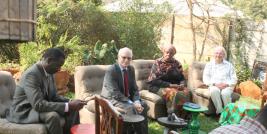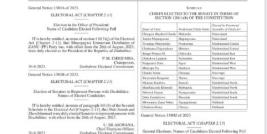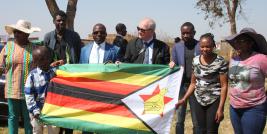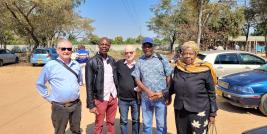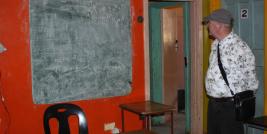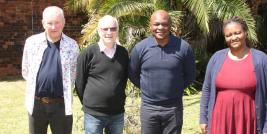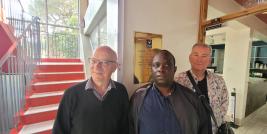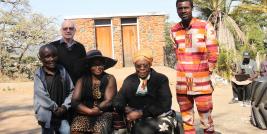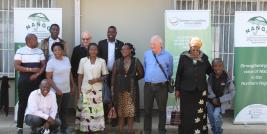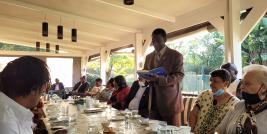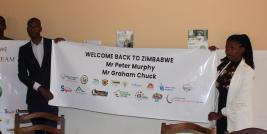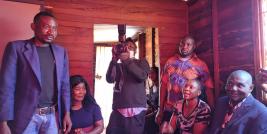Graham Chuck and Peter Murphy, from Australia’s Zimbabwe Information Centre, visited the Zimbabwe Peacebuilding Initiative (ZimPI) from August 11-21, 2024, to strengthen the ties between our two organisations, to learn more about the ZimPI projects, and to advance our main campaigns for the cancellation of sanctions against Zimbabwe, cancellation of Zimbabwe’s international debt, and for Zimbabwe to be accepted back into the Commonwealth.
They had three meetings with Professor Rukuni, leader of the Barefoot Education for Afrika Trust (BEAT) and part of the Zimbabwe Council for Higher Education; visited the Chivinge Family Farm in Mashonaland East; met with the Australian Ambassador; met with Dr Dingane Sithole of the Business Council for Sustainable Development; and did video interviews with the Zimbabwe Broadcasting Corporation and ZimPI.
Meetings with Professor Rukuni
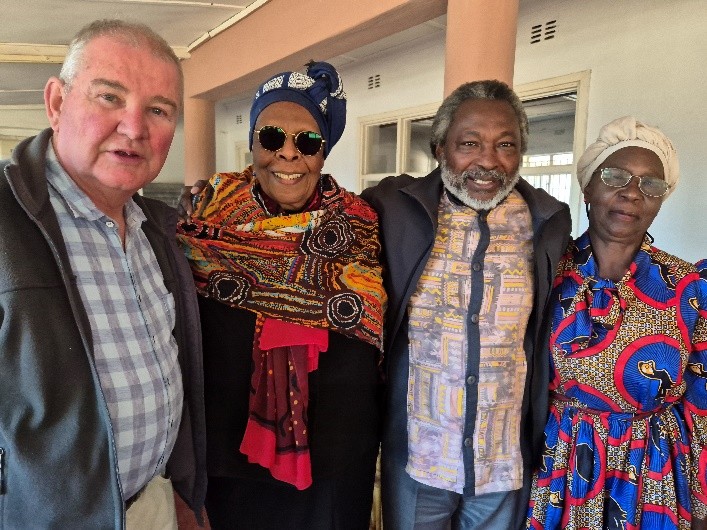
The meetings with Professor Rukuni were workshops to enable ZimPI to present its objectives and projects to the Midlands State University (MSU) in a form that an academic institution could grasp and work with. The expectation is that ZimPI will sign a Memorandum of Agreement with MSU in the coming months.
Professor Rukuni has concluded that most of the economic theory he has taught and applied has failed Zimbabwe. He is seeking a process whereby the land tenure systems - freehold and communal – in Zimbabwe can support the social sector, which is 70 per cent in rural areas. He sees Zimbabwe caught in the Middle Income Trap or Lower Income Trap, from which it cannot escape by using conventional development policies. These policies are applied by governments and academics who have no idea about life at the community or grassroots level.
The Middle Income Trap is defined by low GDP growth, growing inequality and unemployment levels that never reduce. The workers and students conclude that nothing improves and these are the conditions for political conflict.
He argued that BEAT and ZimPI are treating the symptoms of this crisis, that the political system in Zimbabwe isn’t the real issue, it is the social, economic and environmental issues that are the basic drivers which must be addressed.
He thinks that Rural Industrialisation 8.0 (a government policy) is the way to address these basic drivers, and sees the ZimPI effort at national healing as a pathway to nation building.
ZimPI’s strongest area – practical activism in the community - is the application of teaching and research in the community. ZimPI is proposing that its activists create, Village Business Units, Peri-Urban Business Units, and High-Density Business Units depending on their local circumstances.
Visit to Chivinge Family Farm
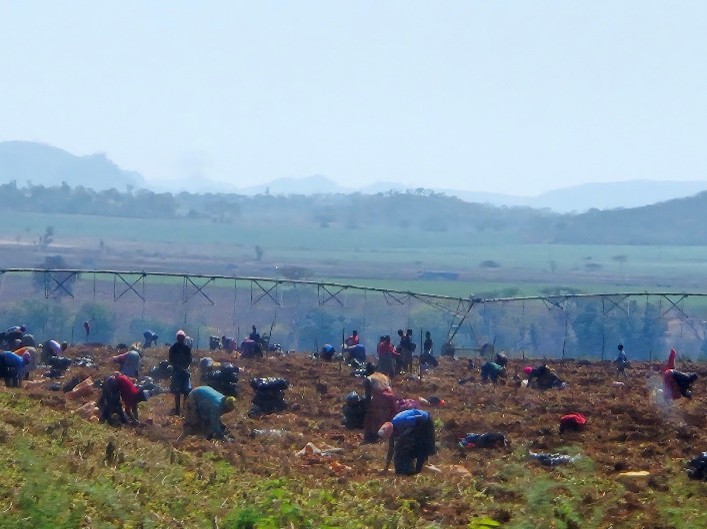
On August 14, ZimPI and ZIC visited the Chivinge Family Farm, north or Murehwa, to learn about agriculture in rural Zimbabwe and the specific history of the liberation struggle in that area in the 1960s-70s. Travelling north from Harare they saw very productive commercial farms as well as the poorer quality of communal lands further north. Murehwa is a very lively market town. The host was Chris Chivinge, a media worker who is part of the ZimPI Network Team.
Under the Smith regime, the security forces imposed “Keeps” in area strongly contested with the liberation armed forces, such as the area north of Murehwa. A Keep was the local name for a strategic hamlet such as those imposed by US forces in Vietnam in the same period. The Keep was a fenced residential area which was locked at sunset and no one could leave until it was unlocked the next day. Anyone found outside at night was considered a terrorist who could be shot. Chris’s father was the school principal, and the school was closed for the period of the conflict. Many of the Chivinge clan responded to the Keep by walking many miles to a mountainous area in the north until the crisis passed.
Chris’ great grandfather had five wives and the British required him to pay a “Hut Tax” of 10 shillings per hut. To get this cash, Chris’ grandfather was required to be an indentured worker on a white farm for two periods of five years. When this was over, the white farmer gave him some farming tools, which he used to upgrade farming on the communal lands when he returned to his father’s home. This grandfather defied some local customs and came under serious attack but was able to persuade his community to accept new farming methods because of the improved crops he produced.
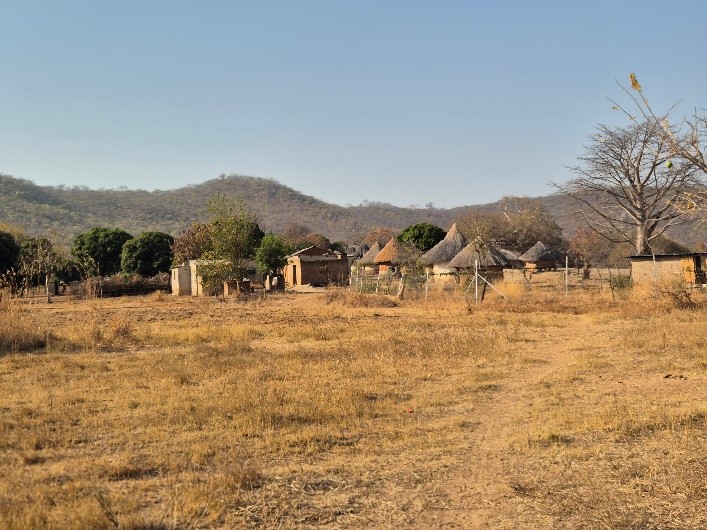
This legacy is evident today in many initiatives on the Chivinge Family Farm to produce commercial outputs.
The farm of just over 5,000 hectares supports many families, and has banana and citrus groves, mango trees, a piggery, sugar, chickens and turkeys, fish ponds, and extensive vegetable production. The quality of housing is good. Limitations are water supply – provide by bores, and finance. Due to the communal title, banks will not provide finance, and all investments must be made from savings.
The older women on the farm were involved in the Association of Women’s Clubs and there is a Women’s Club Hall still there. They are keen to run their own projects, but want solar power rather than wood fires for energy.
Taken together, all these farm projects, if supported, would enable a successful Village Business Unit to be demonstrated as a national model by ZimPI.
Meeting with Australian Ambassador to Zimbabwe
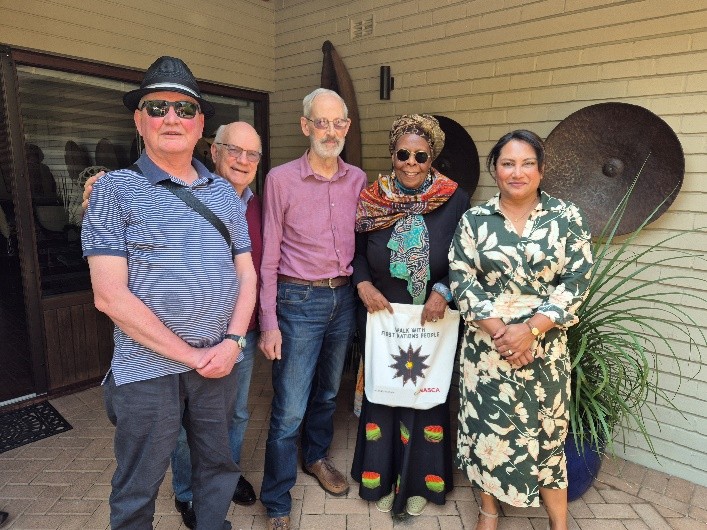
On August 15, Graham Chuck, Senator Sekai Holland and Peter Murphy visited the Australian Ambassador, Ms Minoli Perera. They discussed the history of Australia’s relations with Zimbabwe, and the impact of sanctions.
Meeting Dr Dingane Sithole, Executive Director, Business Council for Sustainable Development, Zimbabwe
Dingane has 18 years’ experience in agro-manufacturing and quality control, with a focus on climate resilience.
In Tanzania, he is managing a project along the Lake Victora Pipeline to create a 12-kilometre-long green belt and to upgrade the country’s climate policies. It received US$110 million from the World Bank and €40 million from the Green Climate Fund in Germany. It will benefit 500,000 people.
With ZimPI, his role is in training and academic input for unemployed graduates plus capable people who have been unable to obtain a university education. He has training incubators which aim to provide these participants with the skills to start up their own businesses, and at the same time reduce carbon emissions and increase resilience. Jim Holland is doing the feasibility study, relating to the regulations and preparing a funding proposal, and Dingane will ensure that the funds are available. The farm will be based at MSU. The project involves soil and water analysis, recycling waste into compost, and cultivation of an industrial hemp crop.
Interview with Zimbabwe Broadcasting Corporation
On August 20, 2024, a journalist from ZBC interviewed Peter Murphy about sanctions, and Senator Sekai Holland about Zimbabwe and the Commonwealth. The interview was broadcast early the next day.
Here is the link to the 3-minute 21 second broadcast of August 21.

